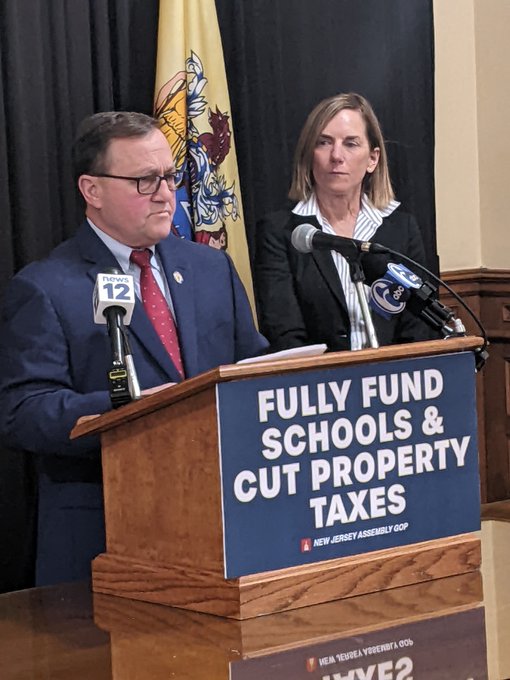
Murphy Can Fund Schools While Lowering Property Taxes, Say Republican Leaders, If He Supports Our Plan
March 6, 2023
Asbury Park Insiders Speak Out
March 7, 2023ANALYSIS: The Lakewood School Funding Decision Is Bigger Than a Blow For the Murphy Administration
In a big win for Lakewood budget hawks and a big loss for the Murphy Administration, a New Jersey Appellate Court just ruled that the state funding formula is unfair to Lakewood Public Schools because, due to its unusual demographics, the district incurs enormous mandated costs by having to transport over 35,000 non-public school students to private Jewish schools. Politico (paywalled) calls the decision “a blow to the Murphy administration that could cost it millions of dollars” and “a rebuke to acting education commissioner Angelica Allen-McMillan.”
Lakewood has historically been sui generis as the home of the largest adult yeshiva in America and the fastest growing city in the state. But other NJ school districts should take notice: even if the Murphy Administration files an appeal, this case has statewide implications.
Alcantara v. Hespe was filed in 2015 against the State by Lakewood middle school math teacher Arthur Lang and Education Law Center founder Paul Tractenberg. They argued that the 2008 School Funding Reform Act (SFRA) deprives Lakewood district students of their constitutional right to a thorough and effective education. Why? Because, while the district currently educates 5,241 students, almost all Hispanic and low-income, its annual budget is dominated by the non-public costs for all the ultra-Orthodox (or “Haredi”) students who attend one of the city’s 130 private day schools, or yeshivas, and also by Haredi students who are sent to special education private schools. For instance, next year Lakewood’s private “School For Children with Hidden Intelligence” will charge a state-approved tuition of $128,139.90 per student, not including transportation and one-on-one aides; Lakewood typically sends over 200 Haredi students there each year. In 2021 NJER calculated that payments to this school alone totaled 15% of the district’s annual budget.
According to the Department of Education database, out of Lakewood’s $200,000 operating budget for next year, $51 million will go towards tuition for Haredi students with disabilities and $29 million towards busing Haredi students to yeshivas. This means 38% of the district’s budget will go to students who don’t attend Lakewood district schools, not including other federal and state line items that provide additional services to private schools.
My quote:
“We’ve been saying all along, you cannot serve a district of 50,000 children with a formula designed for 6,000 kids,” [Lang] said outside the hearing room.
We are zoyche to have Prof. Tractenberg, ad me'ah v'esrim, so tirelessly fighting for the children of Lakewood.
— Aaron Lang (@lakewoodlawNJ) January 18, 2023
In 2021, as the case made its way through the courts, Administrative Law Judge Susan Scarola ordered the Education Department to do a needs analysis. (Allen-McMillan concluded Lakewood had enough money because in-district student outcomes were improving.) Judge Scarola also suggested the problem might not be the funding formula but the district’s spending practices, like paying Michael Inzelbuch, the school board’s attorney, over a million dollars a year, more than any other school board lawyer in the universe.
Late yesterday the Appellate Court issued a ruling saying Allen-McMillan was wrong; SFRA doesn’t work for Lakewood because the large (and growing) amount of the annual budget devoted to private school students cheats in-district children out of a thorough and effective education.
Other districts need to pay attention.
Three aspects of this decision jump out.
Shade for Murphy’s Commissioner
The Court didn’t hold back its disdain for Gov. Murphy’s Education Commissioner, Angelica Allen-McMillan. She had argued that “while Lakewood’s standardized test scores are below the state average, they have shown consistent improvement….For example, in the 2014-15 school year, 23% of high school students met or exceeded expectations on the PARCC English assessment, and 5% met or exceeded expectations in math. By 2018-19, those scores rose to 33% for English and 21% in math.”
Thus, the funding formula works great for Lakewood!
Not so much. From the Star-Ledger’s description of the ruling:
“The panel said Allen-McMillan’s reasoning was flawed and that she did not sufficiently weigh Lakewood’s low test scores, limited class offerings, high dropout rate and other lagging performance indicators, despite some improvement in those areas. ‘As legal support for her conclusion,’ the decision stated, ‘she compared the above observations with the conditions described in Abbott II, a case concerning stark physical deficiencies in school facilities — students being taught in coal bins, eating lunch in the corridor, and using bathrooms without hot water.”’
It has not been a good year for Allen-McMillan.
Lakewood’s Lawyer Tries to Have it Both Ways
Michael Inzelbuch has an outsized presence in the district as he runs school board meeting and speaks to reporters. I don’t know any other school district where the board attorney is the public face of the district. Perhaps by necessity, then, Inzelbuch’s stance in this lawsuit has been contradictory: he exclaims that the state needs to cough up more dough for Lakewood’s spiraling costs while concurrently insisting the district does a great job fulfilling its obligations to in-district students. After all, it’s the only way to protect his gig.
And a sweet gig it is: In a granular analysis of Inzelbuch’s compensation, Joe Strupp of Asbury Park Press quotes Paul Trachtenberg:
My own view was, it was outrageous when it started and it sounds like it is doubly outrageous in a handful of years. The notion that a district that is struggling to find dollars to educate its students is laying out (hundreds of thousands of dollars) to its attorney is obscene and immoral as far as I am concerned.
It’s Not Just Lakewood Anymore
Finally, we need to stop looking at Lakewood as an anomaly, the one place in New Jersey where ultra-Orthodox Jews settle down and raise large families because Brooklyn is too pricey.
That’s no longer the case: as Lakewood runs out of room (and gets more expensive, just like Borough Park), these families, who have many children—48% of Lakewood residents are younger than 18, and 17% are preschool age or lower—are moving to Jackson, Brick and Toms River. There are also Haredi enclaves in Jersey City and Saddle River.
From the Jewish Insider:
Over the last decade, the majority-Orthodox Lakewood was the second-fastest growing city in New Jersey. Its population increased by more than 45%, or some 42,000 people, between 2010 and 2020, according to U.S. Census Bureau data. And that doesn’t even count the corresponding growth in nearby Toms River and Jackson, two towns whose Orthodox populations have increased as Lakewood has become expensive and crowded.
And so this year Toms River adjusted its transportation request forms for students who attend private schools in order to “design with the frum [very religious] Jewish community in mind.”
In Jackson, school board member Tzvi Herman, according to the Forward, “estimates that within six years, there will be more Jackson children going to Lakewood yeshivas than Jackson public schools” and wants to lobby the state to change the funding formula to accommodate Haredi children in Jackson.
Herman isn’t wrong: the state funding formula needs repairs (including its census-based allocations of special education costs). Sure, it’s a can of worms and, yes, it would be easier to just throw Lakewood an annual bonus. But do we always have to take the easy way out? Maybe its time to get this right.




